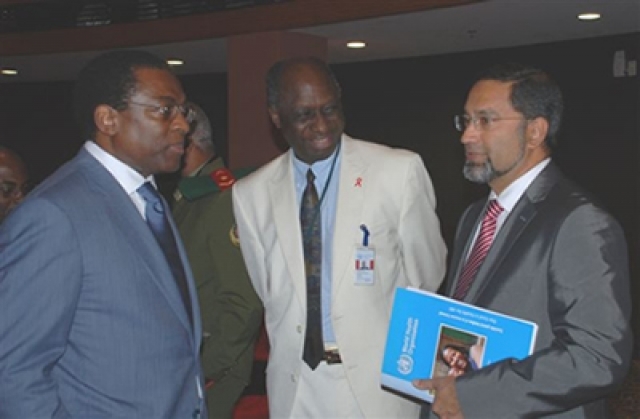Dr Luis Sambo outlines key interventions to improve universal access to HIV/AIDS prevention in Africa

Luanda, 30 September 2011 -- The WHO Regional Director for Africa, Dr Luis Sambo, has highlighted the substantial progress in HIV/AIDS control and encouraged countries of the African Region to implement a package of key interventions to improve universal access to HIV/AIDS prevention, treatment and care including the control of HIV/TB co-infection.
He made these remarks as Guest of Honour while addressing participants at the second workshop of the SADC Military Subcommittee on HIV/AIDS that took place in Luanda from 27 to 29 September 2011. The opening session of the event, chaired by the Angolan Minister of Defence, was attended by members of the Angolan Government, SADC representatives, diplomats accredited to Angola, nongovernmental organizations and United Nations agencies.
The WHO Regional Director drew attention to the uneven distribution of HIV/AIDS cases worldwide, noting that, of the 33 million HIV-infected people globally, 22 million live in sub-Saharan Africa (representing 67% of infections) and that Southern Africa was the most affected subregion with prevalence ranging between 2.8% and 39%.
He mentioned that efforts have resulted in approximately 25% reduction in the number of new HIV cases in 22 African countries and commended African states and international partners for their political commitment, technical support and financial investments.
"All countries of the African Region have made significant progress in HIV prevention, antiretroviral treatment and care provision for AIDS patients", said Dr Sambo. He stressed that the biggest challenge today is to provide treatment for more than two thirds of people who still lack access to antiretrovirals and to ensure that people on treatment do not abandon it otherwise they stand a risk of building resistance to antiretrovirals. He went on to say that "by the end of 2009, more than 3.9 million people living with HIV in the African Region were receiving antiretroviral treatment, representing a coverage of nearly 37% in contrast to only 800 000 people on treatment in 2005" and called on African leaders to strengthen interventions for universal access of AIDS patients to antiretrovirals.
Dr Sambo reiterated the importance of HIV prevention and AIDS treatment as part of the Millennium Development Goals and urged SADC countries to develop six key interventions for effectively achieving universal access to prevention of this pandemic of the century. The interventions are: ensuring public education; scaling up voluntary testing and counselling; promoting primary prevention; intensifying activities for preventing vertical transmission; male circumcision as part of the package of interventions for prevention; and controlling HIV/AIDS and tuberculosis co-infection.
Control of malaria, cholera, haemorrhagic fevers and chronic noncommunicable diseases was also emphasized by the WHO Regional Director in his speech. He pointed out that, based on the epidemiological profile of each country, the SADC Armed Forces should, as a matter of great importance, develop strategies and programmes for preventing the risks factors of these diseases.
For more information, please contact:
Media contact:
José Caetano
Tel: + 472413 35626
E-mail : caetanoj [at] ao.afro.who.int


